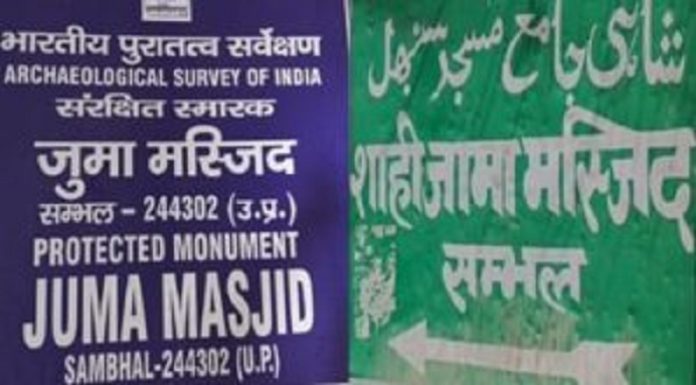Management Committee Protests ASI’s Move, Demands Restoration of Original Name
Lucknow : A fresh controversy has emerged in Uttar Pradesh’s Sambhal district after the Archaeological Survey of India (ASI) changed the name of the historic Shahi Jama Masjid to Jumma Masjid. The mosque’s management committee has strongly objected to the change and announced plans to formally protest and demand that ASI restore the mosque’s original name.
The issue has once again stoked political and communal tensions in the region, especially since the mosque has previously been at the center of several disputes.
ASI’s role in the matter has come under increasing scrutiny. Earlier, during the holy month of Ramadan, the agency broke a long-standing tradition by refusing to carry out regular maintenance and painting of the mosque. Following this denial, the mosque committee approached the Allahabad High Court, which criticized ASI for functioning as though it were under the state government. The court ordered ASI to resume the maintenance, which was eventually completed just before Eid.
However, immediately after the festival, ASI allegedly replaced the mosque’s name with Jumma Masjid, installing a new signboard near a newly built police outpost adjacent to the mosque.
According to ASI’s legal representative, Vishnu Sharma, the new board reflects the name recorded in ASI’s official documents. He also claimed that the previous Shahi Jama Masjid board had been put up without official permission.
Observers are puzzled by ASI’s decision to remain silent on the issue publicly and only speak through its lawyer, raising questions about transparency and accountability.
In response, the mosque management committee has declared its intent to file a formal protest. Committee secretary Farooqi stressed that historical records—including a 1927 agreement between ASI and the mosque committee—recognize the site as Shahi Jama Masjid. He argued that the term “Jumma Masjid” is linguistically incorrect and uncommon, whereas both “Jama” (Urdu) and “Jami” (Arabic) accurately denote a congregational mosque.
Committee lawyer Shakeel Waris said the mosque is widely recognized by its historical name across India. “Changing its name without consultation sets a dangerous precedent,” he remarked. “What justification exists for altering a name clearly established in historical records and legal agreements?”
He further questioned whether ASI sought consent from the mosque authorities or signed a new agreement before making the change. “This seems like an arbitrary and politically motivated action,” he said.
Critics argue that the ASI’s decision reflects a deeper political agenda to appease the ruling BJP government in Uttar Pradesh. They believe the move tarnishes ASI’s credibility and compromises its role as an impartial guardian of India’s heritage.




